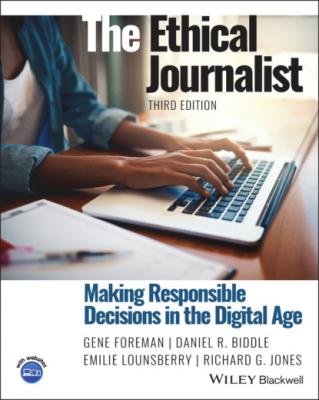The Ethical Journalist. Gene Foreman
Чтение книги онлайн.
Читать онлайн книгу The Ethical Journalist - Gene Foreman страница 8
 401
401
426 402
427 403
428 404
429 405
430 406
431 407
432 408
433 409
434 410
435 411
436 412
437 413
438 414
439 415
440 416
441 417
442 418
443 419
444 420
445 421
446 422
447 423
Detailed Contents
Foreword
Preface
About the Coauthors
Acknowledgments
Part I: A Foundation for Making Ethical Decisions
1 Why Ethics Matters in Journalism
Our society needs news professionals who do the right thing
Contemporary journalists are keenly aware of the ethics of the profession, dealing frequently with ethics questions.
In a profession that cannot be regulated because of the First Amendment, responsible journalists adhere voluntarily to high standards of conduct.
The goal of this book and course is to teach you how to make ethically sound decisions.
Discussing case studies in class is crucial to learning the decision-making process.
The digital era, which has radically changed the way the news is gathered and delivered, has provoked controversy over whether ethics should radically change as well.
Confronted with a daily deluge of information, the public depends on ethical journalists for news that can be trusted.
Point of View: A “Tribal Ferocity” Enforces the Code (John Carroll)
2 Ethics: The Bedrock of a Society
An introduction to terms and concepts in an applied-ethics course
Ethics is about discerning between right and wrong and then doing what is right.
Ancient societies developed systems of ethics that still influence human behavior.
Though often related, ethics and law differ; law prescribes minimum standards of conduct, and ethics prescribes exemplary conduct.
A member of a society absorbs its ethical precepts through a process of socialization.
Our value system – based on the things we prize most – influences how we make moral choices.
An ethical dilemma demands such a moral choice: a person may have to violate one ethical principle to fulfill another.
3 The News Media’s Role in Society
The profession has matured and accepted social responsibility
Journalists generally agree that their fundamental ethical principles are to seek truth, serve the public, and maintain independence from the people they report on.
Journalism, like other professions and institutions, owes society a moral duty called social responsibility.
In the 1940s, the Hutchins Commission defined journalism’s social responsibility: to provide reliable information for the community.
An ethical awakening occurred in journalism during the decade beginning in the mid-1970s.
During this period of reform, many news organizations codified their principles, first addressing conflicts of interest and then refining news-coverage practices.
Today’s journalism reflects decades of rising professionalism, but the transition to the digital era presents new challenges.
Point of View: The Essential Pursuit of Truth (Martin Baron)
Point of View: Decision-Making in the Digital Age (James M. Naughton)
4 For Journalists, a Clash of Moral Duties
Responsibilities as professionals and as human beings can conflict
In the abstract, journalists should avoid becoming involved with the events and the people they cover.
However, certain situations require journalists to decide whether they should step out of their observer role and become participants.
In those situations, guidelines can help journalists reach sound decisions about whether to intervene.
Point of View: Journalists Are Humans, Too (Halle Stockton)
Case Study: The Journalist as a Witness to Suffering
Case Study: Protester Is Beaten; Reporter Steps In
5 The Public and the Media: Love and Hate
The goal for the journalist should be respect, not popularity
Even as the news media mature and accept social responsibility, the public is increasingly hostile, and that is documented in surveys.
As a journalist, you should be aware of this hostility and the likely reasons for it.
You should treat the audience with respect and take complaints seriously; stripping away the rancor, you might find useful lessons.
The public’s hostility has to be put in perspective; it may not be as bad as it seems.
Point of View: Journalism, Seen From the Other Side (Jane Shoemaker)